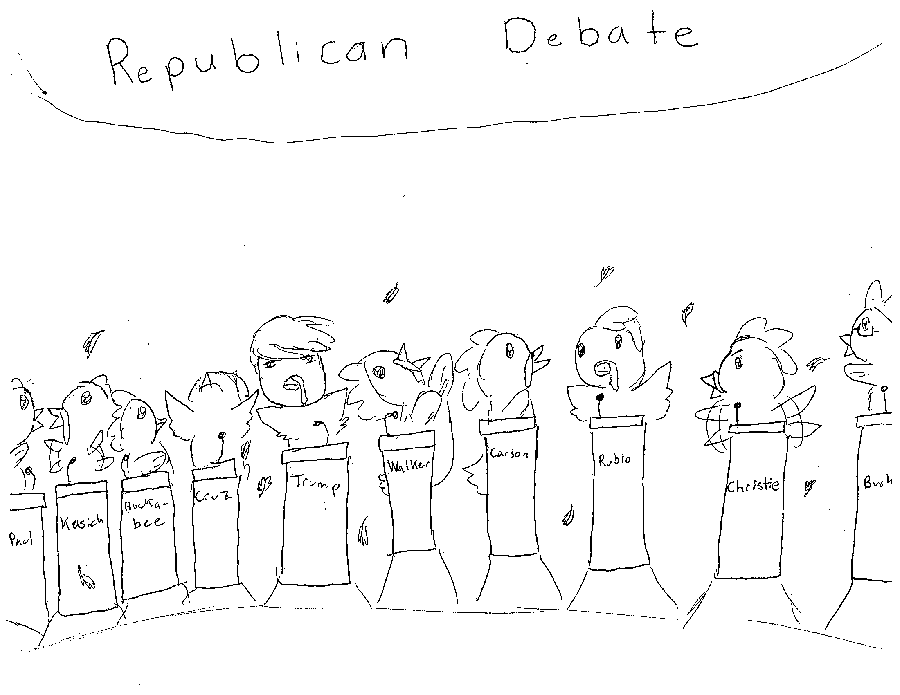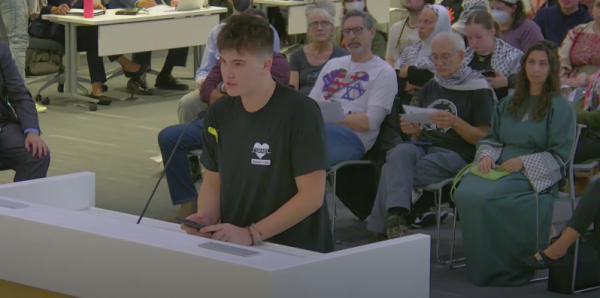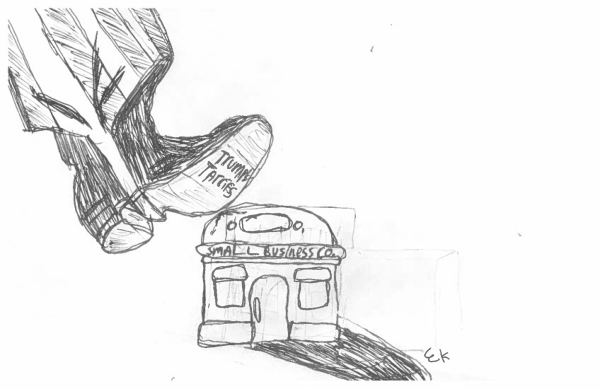Republican Debate Further Alienates Young Voters
The first Republican debate in the 2016 election cycle was held in Cleveland at Quicken Loans Arena on Aug. 6. This debate served as a reminder of some of the major problems that the party faces, including reactionary policies, abrasive candidates and a failure to appeal to younger voters.
The main debate, which began at 9:00 p.m. EST, featured candidates that exemplified these problems.
Businessman Donald Trump, the candidate who remarkably led the polls going in, opened the debate by claiming that he wouldn’t rule out an independent run if he didn’t like the Republican nominee. He also audaciously said that the only reason anyone was discussing illegal immigration was due to his recent controversial comments about immigrants.
He came off as out of touch and selfish, often avoiding questions altogether by giving vague, nondescript answers and claiming that he would make sure America would stop “losing” to Mexico and China. Sadly, he failed to specify how that would be accomplished.
Another candidate, New Jersey Gov. Chris Christie, was likened by TIME to a mob boss in a Jan. 2013 cover due to his appearance, demeanor and his actions. In the article, Michael Crowley discussed Christie’s reputation for “picking fights with Republicans” such as House Majority Leader John Boehner (R-OH).
Christie’s alleged involvement in the 2013 Fort Lee Bridge scandal doesn’t help his reputation either. He allegedly ordered traffic jams to get back at the mayor of Fort Lee for not endorsing him.
Christie also failed to increase his likability, making a slightly exaggerated claim that he was appointed a federal prosecutor the day before 9/11, when in actuality, he wasn’t. He was actually officially appointed in the early months of 2002, according to The Washington Post.
In perhaps the most inadvertently funny moment of the night, Wisconsin Gov. Scott Walker, one of the main enemies of unions all over the country, said “I’m certainly an imperfect man, and it’s only by the blood of Jesus Christ that I’ve been redeemed from my sins,” an assertion that sounds so ridiculous and self-righteous that one might almost question his mental capacity.
Saying something like this actually might help Walker actually gain followers among conservatives, however. One can look at former president George W. Bush, who, in a 2000 Republican Debate, said his favorite political philosopher was Jesus Christ. He proceeded to win the Republican nomination, and subsequently, the presidency.
Candidates like this do not exactly inspire confidence and belief from voters in the 18-29 range, who, according to an article by The Washington Post, are more liberal than prior generations, with a majority believing in gay marriage, a bigger government, the right to abortion in almost all cases and the rights of illegal immigrants.
These voters drove Barack Obama to victory in both the 2008 and 2012 elections, with a 34% advantage in the former, and a 24% advantage in the latter. Viewed by many as decisive in close elections, the young vote has played a pivotal role in both of these contests.
A glance at the recent midterm elections, which have been notorious for a lack of participation from younger generations and Americans as a whole, supports this assertion. Republican successes in the 2010 election, gaining control of the House of Representatives, and the 2014 election, gaining control of the Senate, can possibly be attributed to the overall lack of young voter turnout.
With candidates like these, the Republican Party has already shot itself in the foot when it comes to young voters. GOP leaders are looking for someone who clearly represents their views… someone other than Trump. They are looking for someone who is likeable and doesn’t lie… not Christie. Being perhaps the least religious generation in the country, they also are not looking for someone who makes outlandish claims based upon religion, like Walker.
“I usually lean towards a more liberal view [anyway], and some of the things Donald Trump said, I just really didn’t agree with him at all.” Junior Sam Luria said.
Another position that young voters had an issue with was the staunch anti-immigration attitudes pursued by the candidates. Some of the candidates go even further beyond wanting to stop legal immigration, such as Walker, who wants a system of legal immigration that, in his own words, is focused on “protecting American workers and American wages”, which might entail a potential curb on legal immigration.
“I don’t think it’s fair to the people that get their papers and pay their fees to get into the country.” Luria said.
These candidates also have not pursued policies that would work on closing the growing wealth gap in this country, lowering the cost of a college education and easing the transition into post-college life, all of which are huge concerns among millennials.
This is in contrast to the two leading Democratic candidates: U.S. Senator Bernie Sanders (I-VT) and former Secretary of State Hillary Clinton, who have both taken more populist stances on these issues, thus appealing to young people.
Perhaps the only member of the debate who struck somewhat of a chord with the younger generation was Ohio Gov. John Kasich, who barely got into the debate as it was, but almost certainly left with an increased following.
His answer to a question which asked him whether he would love his daughter if she were gay, despite his opposition to gay marriage, drew applause from the crowd. In his response, he again reaffirmed his belief in traditional marriage, but said he would love his family no matter their sexual orientation, and stated that there is no point in trying to fight the Supreme Court decision that recently legalized gay marriage all over the country. He also recalled his experience of attending a gay wedding of one of his friends.
“While I don’t like the fact that he is anti-gay marriage and pro-life, I don’t think he could have answered the question any better when he said if his daughter was gay, he would still love her the same way and accept the fact that she was gay,” Luria said.
This is in contrast to the vehemently anti-gay marriage attitudes of the other Republican candidates.
Another thing that warmed Kasich to younger voters was his assertion that it was the right thing to take Medicare expansion funds for Ohio, because it helped the poor in his home state get medical care at a reduced cost.
These assertions fits in well with the views of most younger voters, who favor a bigger government and a more active role in the fight against poverty, due to their status as the poorest generation that the country has seen in 25 years.
Kasich was deemed one of the winners of the debate in a Cleveland.com article, along with former neurosurgeon Dr. Ben Carson.

Alex Cala has been writing for The Beachcomber since the fall of 2014, when he was a sophomore. He became the opinion editor the following year. Alex tends...












